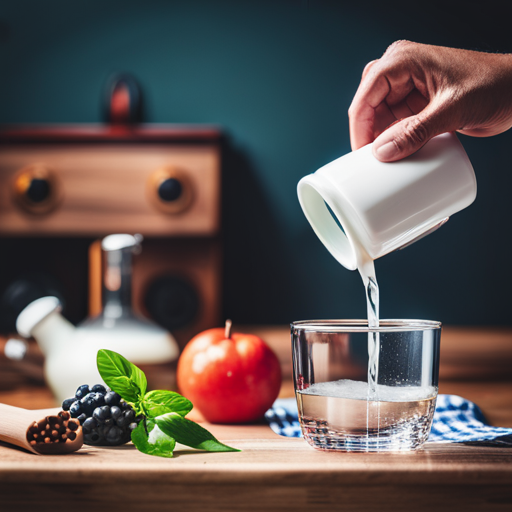If you suffer from nasal congestion or allergies, you may have heard of the benefits of using a neti pot for sinus rinsing. While this natural remedy can be effective, it is crucial to use the right type of water to avoid serious health complications. You may be tempted to use Brita filtered water, but this is not recommended.
Brita filters do not remove all pathogens, including Naegleria fowleri, a deadly brain infection-causing organism. Using Brita filtered water for neti pots is not safe due to the risk of exposure to Naegleria fowleri. This harmful organism can cause a rare but deadly brain infection known as primary amoebic meningoencephalitis (PAM).
Brita filters are designed to remove impurities and improve the taste of water, but they are not effective at eliminating all pathogens. Therefore, using Brita filtered water for neti pots can put you at risk of contracting this dangerous infection.
In this article, you will learn why Brita filtered water is not suitable for neti pots and the importance of using the recommended methods for safe sinus rinsing. In the next section, you will discover the recommended water for neti pots and how to ensure safe sinus rinsing.
Key Takeaways
– Brita filters do not remove all pathogens, including Naegleria fowleri, which can cause a deadly brain infection known as primary amoebic meningoencephalitis (PAM).
– Using Brita filtered water for neti pots is not safe due to the risk of exposure to Naegleria fowleri.
– The CDC recommends using only sterile, warm salt water or distilled water for sinus rinsing to avoid any potential health risks.
– Boiling water for at least one minute will kill all pathogens and ensure that the water is safe to use for sinus rinsing with a neti pot.
Why Brita Water is Risky
You shouldn’t use Brita filtered water in your neti pot because it may still contain harmful pathogens, such as Naegleria fowleri, despite the filter’s ability to remove chemicals and some solids. Brita filters have limitations and aren’t designed to remove all types of bacteria and viruses that can cause infections.
Naegleria fowleri, a type of amoeba that can cause a rare but serious brain infection, is one such pathogen that can survive in Brita filtered water. Using Brita filtered water in your neti pot can put you at risk of developing a life-threatening infection.
Although the risk of getting infected with Naegleria fowleri is low, the consequences can be severe. The CDC recommends using only sterile, warm salt water or distilled water for sinus rinsing to avoid any potential health risks. If you must use Brita filtered water, boil it for at least 1 minute to make it safer for sinus rinsing.
Recommended Water for Neti Pots
Choose the right water for sinus rinsing to ensure it’s safe and effective. The CDC recommends using sterile, warm salt water or distilled water for sinus rinsing with a neti pot.
Salt water has many benefits, including helping to wash away allergens and debris. It can also help reduce inflammation and moisturize nasal passages. Additionally, using salt water reduces the risk of infection compared to using tap water or filtered water from a Brita filter.
If boiling water isn’t an option, there are alternative methods for sterilizing water for use in a neti pot. Microwaving Brita-filtered water is one option, but it may not fully sterilize the water. Kettles or pots are easier to use for boiling water than microwaves.
It’s important to remember that using improperly treated water for sinus rinsing can lead to serious health complications. Therefore, it’s best to follow the CDC’s recommendations and use sterile, warm salt water or distilled water for sinus rinsing with a neti pot.
Importance of Sterilization
It’s crucial to properly sterilize the water used for sinus rinsing to avoid potential health complications. When using a neti pot, the water must be free of any contaminants that could harm the delicate sinus tissues.
Sterilization of water can be achieved through various methods, but the most common ones are boiling and microwaving. When it comes to sterilizing water for neti pot use, boiling is the most effective method.
Boiling water for at least one minute will kill all pathogens and ensure that the water is safe to use. Microwaving water can also be used as an alternative to boiling, but it may not fully sterilize the water. Kettles or pots are easier to use for boiling water than microwaves.
In summary, proper sterilization of water is essential for safe and effective sinus rinsing with a neti pot.
Conclusion
So, there you have it. Using Brita filtered water for neti pots is not a safe choice. It may seem like a convenient and natural option, but it’s important to prioritize your health and avoid serious complications.
Naegleria fowleri is a rare but deadly pathogen that can cause brain infections, and Brita filters do not remove it from the water.
To ensure safe sinus rinsing, it’s recommended to use distilled or sterile water that has been boiled and cooled. It’s also important to properly sterilize your neti pot after each use.
By taking these precautions, you can continue to enjoy the benefits of neti pots without putting your health at risk. Stay safe and healthy!




